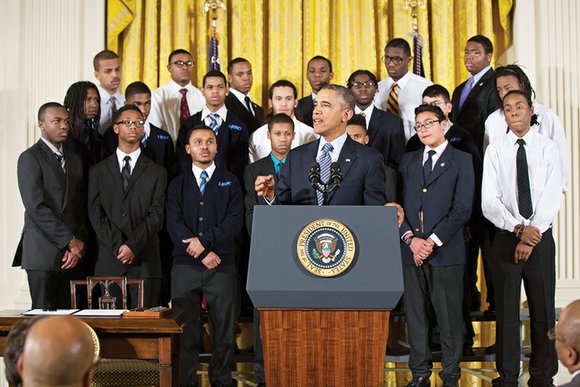Officials hope President Obama’s ‘My Brother’s Keeper’ program will remain under next administration
7/8/2016, 5:54 p.m.

By James Wright
Trice Edney News Wire
President Obama has seven months left in office. One of the leaders of one of his key initiatives is hard at work ensuring the president’s legacy will continue after he leaves the White House.
President Obama founded “My Brother’s Keeper” in February 2014 to focus the federal government and the private and nonprofit sectors on improving the lives of African-American boys and young men. James Cole, the general counsel and deputy secretary of the U.S. Department of Education, said the initiative has expanded its mandate over its two years of existence. In January, Mr. Cole began overseeing the My Brother’s Keeper program.
“We have had an exciting two years,” Mr. Cole told the AFRO on June 14 during the School without Walls graduation ceremony at the Lerner Auditorium at George Washington University in Washington.
“We are working hard to address opportunity gaps for young males of color and we have reached into such programs as English as a Second Language and those who have been diagnosed with disabilities.
“We are working hard to see that young men of color reach their full potential,” he continued.
My Brother’s Keeper has programs in nearly 250 communities in all 50 states and the District of Columbia. The initiative has more than $600 million in private sector and philanthropic grants and in-kind resources, and $1 billion in low-interest financing, according to the report, “My Brother’s Keeper 2016 Progress Report: Two Years of Expanding Opportunity and Creating Pathways to Success.” The report said more than 80 percent of the initiatives the task force sent to President Obama two years ago have gone into effect or are on track.
One of the activities relates to opportunities in the summer. Mr. Cole said boys of color who are eligible for free and reduced lunch can participate in a variety of programs to strengthen their academic and social skills.
“These are the students who need the most help so we are setting them up with mentors,” he said. “We noticed that when young people go on summer vacation, they tend to lose some of what they learned, so we have programs and mentors that can keep them academically engaged.”
The District of Columbia has a program where mentors work with their protégés on improving their reading skills. That effort is part of D.C. Mayor Muriel Bowser’s Emerging Males of Color program that kicked off in January 2015.
Mayor Bowser’s EMOC is an example of what Mr. Cole is talking about when discussing state-level components of the initiative.
“These problems need to be dealt with on the ground, in the communities,” he said. “We are dealing with the mayors in every state, and where the programs are utilized, we have seen gains. When the president leaves office, this is how the work will continue.”
Mr. Cole said corporations and nonprofits are continuing their financial support. “That will go beyond this administration,” he said.
He could not say whether the next president will continue the program at the federal level.
Mr. Cole could personally relate to My Brother’s Keeper. In his address to students at the Washington school, he talked about his tough early life on Chicago’s South Side. His mother died of a heart attack and his father had Alzheimer’s disease.
“I was the oldest child, so I became responsible for the family,” Mr. Cole said. “Just a few weeks after my Mom passed, I was robbed at gunpoint. At times, we lived on food stamps and worried when they’d next turn the lights off.”
Mr. Cole credited an English teacher for inspiring him to greatness. He went on to graduate from the University of Illinois, Urbana-Champaign, and the University of Chicago School of Law. After graduating from law school, he clerked for U.S. Appeals Court Judge Stephanie K. Seymour of the 10th Circuit. And in 1996, he went to work for the New York law firm of Wachtell, Lipton, Rosen & Katz, where he became a partner in 2004. He left the firm in 2011, to become deputy general counsel to the U.S. Department of Transportation, and in December 2014, he was confirmed by the U.S. Senate to his present position.
Leonard Haynes, a retired senior executive with the Department of Education, thinks highly of the work Mr. Cole has done for the initiative.
“James has been at the department for two years and I know he is committed to increasing more and better educational opportunities for young people,” Mr. Haynes said. “As the general counsel, he has his eye on the disadvantaged, and it is good to have a person with that type of commitment in that position.”






